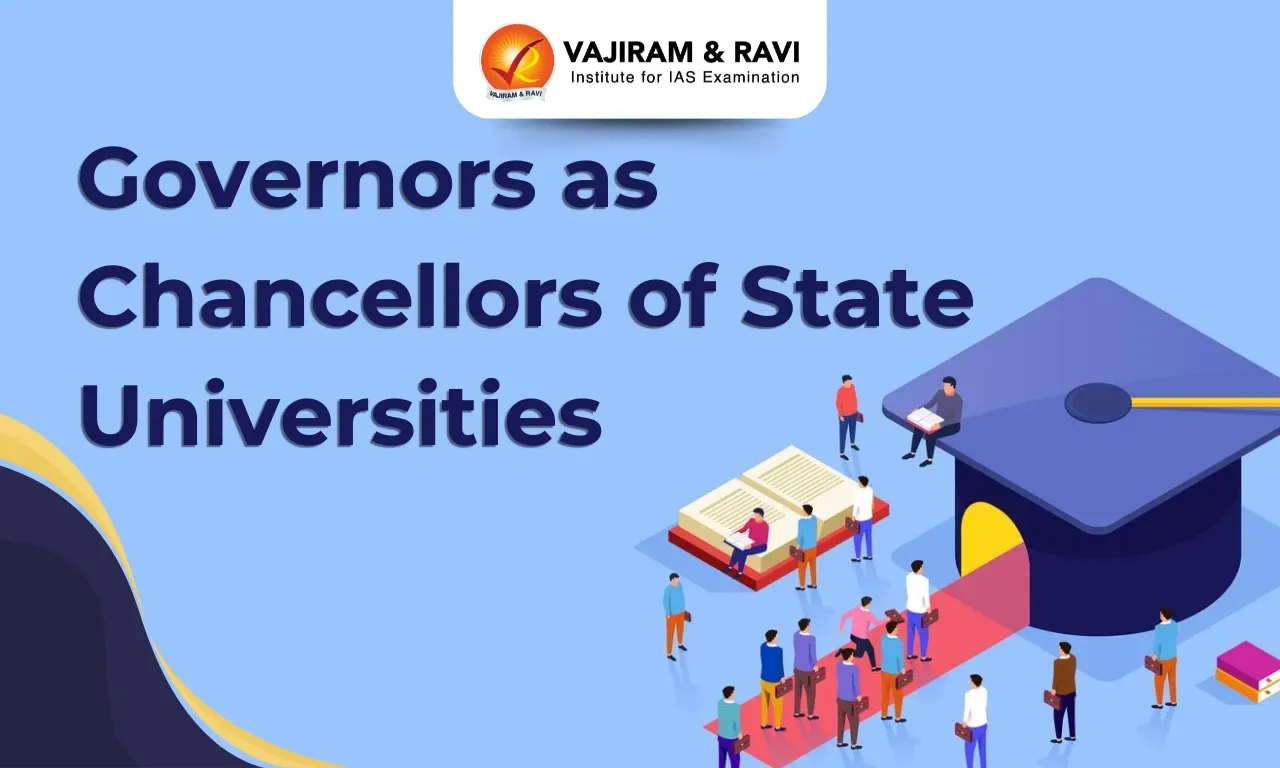What’s in Today’s article?
- Should Governors Be Chancellors of State Universities Latest News
- Historical Context of the Governor’s Role
- Challenges of the Current System
- Insights from Commissions and Alternatives
- Reform Models
- Need for Progressive Reforms
- Conclusion
- Should Governors Be Chancellors of State Universities FAQs
Should Governors Be Chancellors of State Universities Latest News
- The role of the Governor as Chancellor of State universities has been a subject of intense debate in recent times.
Historical Context of the Governor’s Role
- The role of Governors as Chancellors of State universities in India traces its roots to colonial-era policies.
- Introduced in 1857 with the establishment of universities in Calcutta, Bombay, and Madras, this model aimed to maintain British control over educational institutions.
- Post-independence, the system was retained without reconsideration of its relevance in a democratic and federal context.
- Governors, in their capacity as Chancellors, wield significant authority over universities, including appointing Vice-Chancellors, nominating syndicate members, and approving university statutes.
- However, this role has often led to conflicts, especially in states governed by opposition parties.
Challenges of the Current System
- Politicization of the Role:
- From the late 1960s, Governors transitioned from neutral figures to politically influenced appointees.
- Studies reveal that 52% of Governors between 1950 and 2015 were active politicians, undermining the credibility of the position.
- Conflicting Authorities:
- The dual accountability of universities to both state governments and Governors has led to governance challenges, including delays in appointments and decision-making.
- Lack of Expertise:
- Many Governors lack the academic qualifications necessary to guide universities effectively. This gap often results in non-transparent decisions and political interference.
- Erosion of Federal Principles:
- Allowing centrally appointed Governors to control state-funded institutions dilutes federalism, reducing universities’ accountability to state governments.
Insights from Commissions and Alternatives
- Several commissions have highlighted the limitations of the Governor’s role:
- Sarkaria Commission (1983-88): Recognized the Governor’s statutory role but recommended consultations with Chief Ministers in university matters.
- M.M. Punchhi Commission (2007-10): Advocated for separating the Governor’s constitutional and statutory roles, suggesting that states appoint eminent academicians as Chancellors.
Reform Models
- Ceremonial Role: States like Gujarat, Karnataka, and Maharashtra have redefined the Governor’s role to a ceremonial one, acting on the advice of the Council of Ministers.
- State-Appointed Chancellors: Telangana and Kerala propose appointing distinguished academicians or public figures as Chancellors, but such reforms face delays in Presidential assent.
- University-Elected Chancellors: Global practices, like those in Oxford and Melbourne, allow university bodies to elect Chancellors, ensuring autonomy and accountability.
Need for Progressive Reforms
- The colonial legacy of Governors as Chancellors must be dismantled to ensure university autonomy, foster academic excellence, and minimize political interference.
- Reforming university governance aligns with global best practices and reinforces India’s federal structure.
- States like Tamil Nadu, Kerala, and West Bengal await Presidential assent for their reform Bills, highlighting the need for equitable and timely decision-making at the national level.
Conclusion
- Reforming the role of Governors as Chancellors is essential for fostering transparent, accountable, and autonomous university governance.
- By adopting models that prioritize academic independence and minimize political entanglements, India can create an educational framework aligned with democratic principles and global standards.
Should Governors Be Chancellors of State Universities FAQs
Q1. What is the historical origin of Governors as Chancellors in India?
Ans. The practice dates back to British colonial rule in 1857 for maintaining control over universities.
Q2. Why is the Governor’s role as Chancellor debated?
Ans. The role is criticized for politicization, governance conflicts, and undermining university autonomy.
Q3. What reforms have been proposed for the Governor’s role as Chancellor?
Ans. Suggestions include appointing ceremonial Chancellors, state-appointed academicians, or university-elected leaders.
Q4. Which states have reformed the Governor’s role as Chancellor?
Ans. Gujarat, Karnataka, and Maharashtra have implemented variations of the ceremonial Chancellor model.
Q5. What is the primary challenge in reforming the Governor’s role?
Ans. Delays in Presidential assent to state Bills and the politicization of the approval process hinder reforms.
Source: TH
Last updated on June, 2025
→ UPSC Notification 2025 was released on 22nd January 2025.
→ UPSC Prelims Result 2025 is out now for the CSE held on 25 May 2025.
→ UPSC Prelims Question Paper 2025 and Unofficial Prelims Answer Key 2025 are available now.
→ UPSC Calendar 2026 is released on 15th May, 2025.
→ The UPSC Vacancy 2025 were released 1129, out of which 979 were for UPSC CSE and remaining 150 are for UPSC IFoS.
→ UPSC Mains 2025 will be conducted on 22nd August 2025.
→ UPSC Prelims 2026 will be conducted on 24th May, 2026 & UPSC Mains 2026 will be conducted on 21st August 2026.
→ The UPSC Selection Process is of 3 stages-Prelims, Mains and Interview.
→ UPSC Result 2024 is released with latest UPSC Marksheet 2024. Check Now!
→ UPSC Toppers List 2024 is released now. Shakti Dubey is UPSC AIR 1 2024 Topper.
→ Also check Best IAS Coaching in Delhi






















